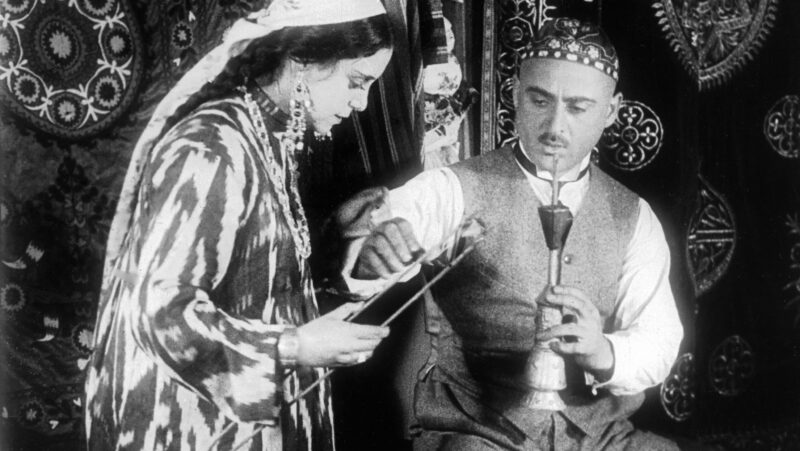Virtuoso traditional Uzbek musicians in Pordenone to accompany Moxov Qiz by Oleg Frelikh (1928)
AND FROM PALESTINE, THE PROPAGANDA FILM THE LAND OF PROMISE
On Tuesday 8 October, Giornate del Cinema Muto 2024 / Pordenone Silent Film Festival will feature cinema from Uzbekistan, at the heart of one of the major retrospectives organised with the National Film Fund of Uzbekistan and with the support of the Uzbekistan Art and Culture Development Foundation.
Moxov Qiz (The Leper) will be screened at the Teatro Verdi at 9 p.m. This 1928 film starred actress Ra Messerer and was directed by Oleg Frelikh with a screenplay by Lolakhan Saifullina. The film, which examines the condition of women and feminine emancipation, is an adaptation of the French novel Kamir. Roman d’une femme arabe by Ferdinand Duchene, which was translated in several languages, including Uzbek. With the film, Saifullina moves the story from Algeria to Turkestan and transforms it from a tragic love story between an Algerian woman and a French officer to the tale of an Uzbek girl who, in accordance with tradition, is promised in marriage to a rich merchant. Director Oleg Frelik, who alternated between directing and acting in the 1920s, fills the film with symbols, as in the scene where he superimposes the triangular talisman onto a rack of billiard balls, which the future husband breaks violently. The power and fascination of the images are underscored and heightened by the traditional score that will be performed live by Abror Zufarov and Sobirjon Tuyokov.
The rediscovery section presents an “aquatic” programme with a series of marine adventure films, including the scientific docu hybrid Wonders of the Sea (US 1922) by J. Ernest Williamson. This is one of the first examples of underwater filming from a submersible device. The section (R&R) also features the Hollywood film Folly of Vanity (US 1924) by Maurice Elvey and Henry Otto, with delirious scenes in which semi-nude dancers perform extraordinary underwater choreographies in Neptune’s kingdom. The cast includes Betty Blythe, who shocked audiences when she appeared nude in the––now lost– The Queen of Sheba.
The day’s especially rich programme includes Carl Theodor Dreyer’s masterpiece Blade Af Satans Bog (Leaves from Satan’s book, DK 1920). This film, of great artistic value and expressive power, reveals how evil (Satan) is present constantly throughout human history with four separate episodes set in different historic periods and locations: Jerusalem during the time of Christ, the Spanish Inquisition, the French Revolution and the 1918 Finnish Civil War. Due to its structure, Blade Af Satans Bog is often compared to Intolerance even though Dreyer wrote his screenplay in 1913, three years before Griffith made his film. Instead, it seems more likely that both films were modelled on Satan, a 1912 Italian film––now lost––directed by Luigi Maggi, that tells the stories of demons in four historic episodes. The screening at the Teatro Verdi will be accompanied by a live performance by pianist John Sweeney.
For the retrospective dedicated to screenwriter Ben Carré, the Festival will feature The Pride of The Clan (US 1917), one of the films directed by Maurice Tourneur and starring Mary Pickford, who founded United Artists a year later with Charlie Chaplin, DW Griffith and future husband Douglas Fairbanks. In her autobiography, Pickford tells how she risked death when the boat she was on sank during the making of the film (a fishermen’s story filmed in New England that Ben Carré skilfully transformed into a highly believable Scotland).
A film with obvious ties to the tragedies of our own times is Land Of Promise (Palestine, 1924) by director Ya’acov Ben Dov, a member of the Zionist movement, which pushed for the establishment of a Jewish community in Palestine. The exceptional restoration by the Prague film archive enhances the film’s visual beauty with breathtaking colours created through tinting. While the film is of undisputed artistic value, the obviously propagandistic ending leaves audiences nonplussed.
The three Colombian films on the afternoon’s programme introduce two important figures in the history of Colombian cinematography: Vincenzo and Francesco Di Domenico, operators, distributors, producers and directors of newsreels, documentaries and fiction films during the silent film era. The Di Domenico brothers also founded the Latin American film industry company SICLA, which, with Manizales Film Company, were the two most important production companies in Colombia. Manizales also produced Madre (Chile, 1924), the melodrama on today’s programme. Only two sequences of this film remain, for a total duration of just 22 minutes. They are stored at the Archives of the Fundación Patrimonio Filmico Colombiano, which restored them in 1997. Madre was Manizales’s first film, directed by Samuel Velasquez, a painter, art critic, writer and author of the novel of the same name for which he won a prestigious literary award in 1896.
Tuesday’s events will conclude with the second programme of feminist fragments titled “Queer Eyes, Loose Lips and Detachable Limbs” with––among others––two Indian films featuring a spectacular image of the Taj Mahal, and the Italian film La leggenda di Santa Barbara with Lyda Borelli, produced by Cines in 1919.
The Pordenone Silent Film Festival / Le Giornate del Cinema Muto is made possible thanks to the support of the Regione Autonoma Friuli Venezia Giulia, the Ministry of Culture — Direzione Generale Cinema, the city of Pordenone, the Pordenone-Udine Chamber of Commerce and the Fondazione Friuli.


 Italiano
Italiano
Recent Comments